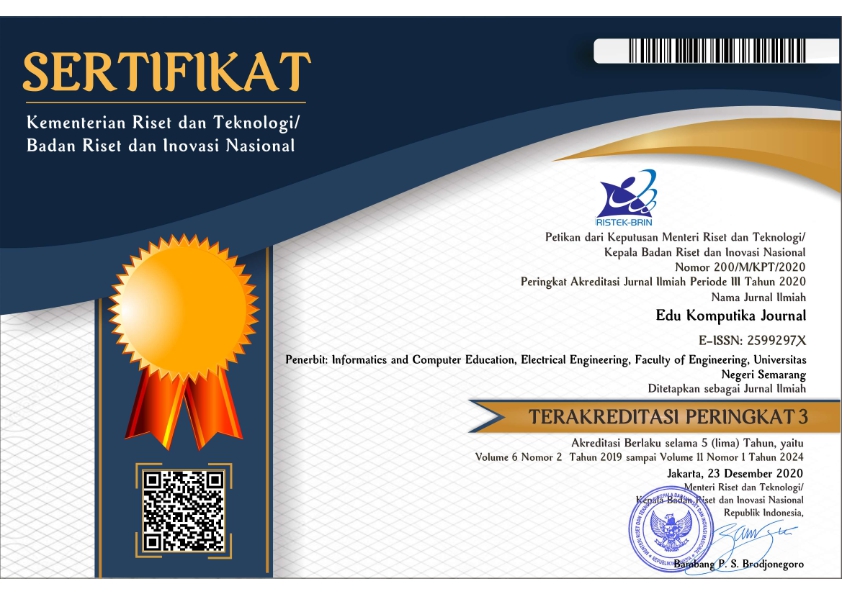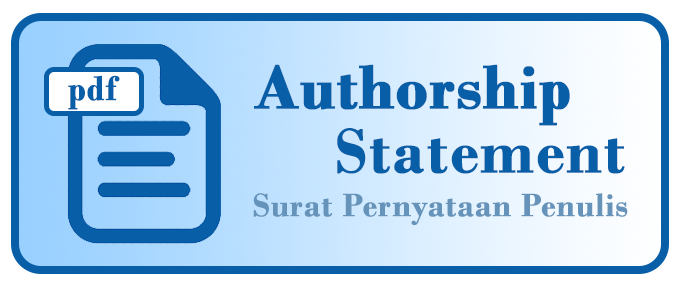Integrasi Technology Readiness dan Technology Acceptance Model untuk Analisis Kesiapan Pengguna Terhadap Penerimaan Aplikasi Parenting
Abstract
Aplikasi Parenting, ditujukan untuk membantu orang tua milenial dalam menemukan dan menentukan minat dan potensi anak khususnya pada anak usia dini. Penerapan konsep LMS (Learning Management System) pada Aplikasi Parenting Pinggu Hompimpaa memiliki tantangan tersendiri, LMS yang berfokus pada pendidikan anak usia dini masih jarang ditemukan. LMS yang sering dimanfaatkan umumnya pada jenjang pendidikan dasar atau pendidikan formal. Sebelum dikenalkan lebih lanjut ke dalam pangsa pasar yang lebih luas, perlu diadakan pengukuran tingkat kesiapan user terhadap penerimaan user. TR dan TAM dikombinasikan menjadi sebuah metode TRAM (Technology Readiness and Acceptance model) dengan penambahan satu variabel yaitu Persepsi kenyamanan. Model ini meningkatkan cakupan model kesiapan dan penerimaan teknologi sebelumnya dalam hal penerapan dan kekuatan penjelas dengan cara mengukur adopsi teknologi dalam situasi di mana adopsi tidak diinstruksikan oleh tujuan organisasi. Hasil akhir yang diolah menggunakan SmartPLS 3 dengan 6 hipotesis meyatakan variabel TRAM dengan variabel Persepsi kenyamanan memberikan respon yang positif terhadap niat dan penerimaan pengguna dalam menggunakan aplikasi parenting yang bertujuan untuk meningkatkan minat dan bakat anak.
References
Afiana, F. N., Bratakusuma, T., Rifai, Z., Pribadi, P., & Dian, O. A. (2021). Aplikasi Pembelajaran Anak Usia Dini Untuk Menentukan Minat Bakat Dengan Teknologi AI. Indonesian Journal on Software Engineering (IJSE), 7(2), 196–204.
BAKIRTAŞ, H., & AKKAŞ, C. (2020). Technology Readiness and Technology Acceptance of Academic Staffs. International Journal of Management Economics and Business, 16(4), 1043–1058. https://doi.org/10.17130/ijmeb.853629
Bouwman, M. E., Kommers, P. A. M., & Van Deursen, A. J. A. M. (2014). Revising TAM for hedonic location-based social networks: the influence of TAM, perceived kenyamanan, Inovasi and extraversion. International Journal of Web Based Communities, 10(2), 188–210. https://doi.org/10.1504/IJWBC.2014.060355
Buyle, R., Van Compernolle, M., Vlassenroot, E., Vanlishout, Z., Mechant, P., & Mannens, E. (2018). Technology Readiness and Acceptance Model” as a Predictor for the Use Intention of Data Standards in Smart Cities. Media and Communication, 6(4 Theoretical Reflections and Case Studies), 6(4), 127–139.
Chan, S. W. Y., Rao, N., Cohrssen, C., & Richards, B. (2021). Predicting child outcomes in Bhutan: Contributions of parenting support and early childhood education programmes. Children and Youth Services Review, 126(January), 106051. https://doi.org/10.1016/j.childyouth.2021.106051
Chang, Y. W., & Chen, J. (2021). What motivates customers to shop in smart shops? The impacts of smart technology and technology readiness. Journal of Retailing and Consumer Services, 58(May 2020), 102325. https://doi.org/10.1016/j.jretconser.2020.102325
Chen, S. C., Liu, M. L., & Lin, C. P. (2013). Integrating technology readiness into the expectation-confirmation model: An empirical study of mobile services. Cyberpsychology, Behavior, and Social Networking, 16(8), 604–612. https://doi.org/10.1089/cyber.2012.0606
Choi, Y., & Ahn, H. Y. (2021). Developing and Evaluating a Mobile-based Parental Education Program for Preventing Unintentional Injuries in Early Childhood: A Randomized Controlled Trial. Asian Nursing Research, 15(5), 329–336. https://doi.org/10.1016/j.anr.2021.12.001
Clara Wijaya Rosa, M., Ganis Sukoharsono, E., & Saraswati, E. (2019). The Role of Venture Capital on Start-up Business Development in Indonesia. Journal of Accounting and Investment, 20(1). https://doi.org/10.18196/jai.2001108
Danarahmanto, P. A., & Aziz, Y. (2019). A BUSINESS MODEL TO SUPPORT SUSTAINABLE PERFORMANCE OF DIGITAL STARTUP COMPANIES Pri. CSID Journal of Infrastructure Development, 2(2), 168–176.
Dessyana, A., & Dwi Riyanti, B. P. (2017). The Influence of Innovation and Entrepreneurial Self-Efficacy to Digital Startup Success. International Research Journal of Business Studies, 10(1), 57–68. https://doi.org/10.21632/irjbs.10.1.57-68
Dzulkifli, F., Wahyuni, E. D., & Wicaksono, G. W. (2020). Analisis Kesiapan Pengguna Lective Menggunakan Metode Technology Readiness Index (Tri). Jurnal Repositor, 2(7), 923. https://doi.org/10.22219/repositor.v2i7.676
Ferreira, J. B., da Rocha, A., & da Silva, J. F. (2014). Impacts of technology readiness on emotions and cognition in Brazil. Journal of Business Research, 67(5), 865–873. https://doi.org/10.1016/j.jbusres.2013.07.005
Fitriani, Y. (2020). Analisa Pemanfaatan Learning Management System (Lms) Sebagai Media Pembelajaran Online Selama Pandemi Covid-19. Journal of Information System, Informatics and Computing, 4(2), 1. https://doi.org/10.52362/jisicom.v4i2.312
Fornell, C., & Larcker, D. F. (1981). Evaluating Structural Equation Models with Unobservable Variables and Measurement Error. Journal of Marketing Research, 18(1), 39–50. https://doi.org/https://doi.org/10.2307/3151312
Gestiardi, R., Sarwanto, S., Chumdari, C., & Maryani, I. (2021). Using an Technology Readiness Model to Understand Persepsi kegunaan of Learning in the Covid-19 Era. International Journal of Elementary Education, 5(4), 631. https://doi.org/10.23887/ijee.v5i4.39188
Handayani, W. P. P., & Harsono, M. (2016). Aplikasi Technology Acceptance Model (TAM) Pada Komputerisasi Kegiatan Pertanahan. Jurnal Economia, 12(1), 13–22.
Hastungkara, D. P., & Triastuti, E. (2020). Application of E-Learning and Artificial Intelligence in Education Systems in Indonesia. ANGLO-SAXON: Jurnal Ilmiah Program Studi Pendidikan Bahasa Inggris, 10(2), 117. https://doi.org/10.33373/as.v10i2.2096
Kiliç-Çakmak, E. (2010). Learning strategies and motivational factors predicting information literacy self-efficacy of e-learners. Australasian Journal of Educational Technology (AJET), 26(2), 192–208. https://doi.org/https://doi.org/10.14742/ajet.1090
Lam, S. Y., Chiang, J., & Parasuraman, A. (2008). THE EFFECTS OF THE DIMENSIONS OF TECHNOLOGY READINESS ON TECHNOLOGY ACCEPTANCE: AN EMPIRICAL ANALYSIS. Journal of Interactive Marketing, 22(4), 19–39. https://doi.org/10.1002/dir
Lin, H.-H., Shih, H.-Y., & Sher, P. J. (2007). Technology Readiness into Technology Acceptance: The TRAM Model. Psychology & Marketing, 24(7), 641–657.
Lin, K. Y., & Lu, H. P. (2011). Why people use social networking sites: An empirical study integrating network externalities and motivation theory. Computers in Human Behavior, 27(3), 1152–1161. https://doi.org/10.1016/j.chb.2010.12.009
Masudin, I., Pangenggar, I. L. T., Restuputri, D. P., & Kusumadewi, S. (2018). A REVIEW OF TECHNOLOGY READINESS INDEX ( TRI ) ON RETAIL INDUSTRY : APPROACH AND APPLICATION. Seminar Nasional Teknologi Dan Rekayasa (SENTRA) 2018, 113–118.
Mehrolia, S., Alagarsamy, S., & Indhu Sabari, M. (2021). Moderating effects of academic involvement in web-based learning management system success: A multigroup analysis. Heliyon, 7(5), e07000. https://doi.org/10.1016/j.heliyon.2021.e07000
Nguyen, N. T. (2021). A study on satisfaction of users towards learning management system at International University – Vietnam National University HCMC. Asia Pacific Management Review, 26(4), 186–196. https://doi.org/10.1016/j.apmrv.2021.02.001
Nita, T., Cahyani, D., Pradnyana, I. M. A., Sugihartini, N., & Teknik, F. (2020). PENGUKURAN TINGKAT KESIAPAN PENGGUNA SISTEM INFORMASI DATA POKOK PENDIDIKAN DASAR MENGGUNAKAN TECHNOLOGY READINESS INDEX ( TRI ) ( STUDI KASUS : SEKOLAH DASAR DI KECAMATAN SUKASADA ). KARMAPATI, 9(2), 88–95.
Pangriya, R., & Priya Singh Assistant Professor, A. (2021). The Differencing Views of Technology Readiness and Acceptance Model: A Literature Review Retail Automation View project Customer Attitude-Private Label Brands View project The Differencing Views of Technology Readiness and Acceptance Model: A Literature R. Article in Turkish Journal of Computer and Mathematics Education, 12(4), 1–22. https://www.researchgate.net/publication/354353603
Parasuraman, A. P. (2000). Technology Readiness Index (Tri): A Multiple-Item Scale to Measure Readiness to Embrace New Technologies. Journal of Service Research, 2(4), 307–320. https://doi.org/https://doi.org/10.1177/109467050024001
Prabowo, T., Winarno, W. W., & Sudarmawan, S. (2020). Analysis of Technology Acceptance Model Method To Predict A Person’s Interest In The Acceptance of A Technology : A Literature Review. Journal of Informatics and Telecommunication Engineering, 4(1), 260–269. https://doi.org/10.31289/jite.v4i1.3986
Romarina, A. (2016). Economic Resilience Pada Industri Kreatif Gunamenghadapi Globalisasi Dalam Rangka Ketahanan Nasional. Jurnal Ilmu Sosial, 15(1), 35. https://doi.org/10.14710/jis.15.1.2016.35-52
Roy, S. K., Balaji, M. S., Sadeque, S., Nguyen, B., & Melewar, T. C. (2017). Constituents and consequences of smart customer experience in retailing. Technological Forecasting and Social Change, 124, 257–270. https://doi.org/10.1016/j.techfore.2016.09.022
Sari, P. P., Winarko, B., Islami, M. J., & Kardono, S. S. (2021). Model Tata Kelola Startup di Kabupaten Jember. Jurnal Komunika: Jurnal Komunikasi, Media Dan Informatika, 9(2), 114. https://doi.org/10.31504/komunika.v9i2.3658
Setiawan, R. A., & Oktaviani, P. (2021). EXAMINING THE TECHNOLOGY ACCEPTANCE MODEL IN THE ADOPTION OF NARCOTIC PRECURSOR REPORTING SYSTEM (SIPPRE). Jurnal TAM (Technology Acceptance Model), 12(2), 158–163.
Shanmugavel, N., & Micheal, M. (2022). Exploring the Marketing Realted Stimuli and Personal Inovasi on the Purchase Intention of Electric Vehicles Throught Technology Acceptance Model. Cleaner Logistics and Suppaly Chain, 3(3).
Sidauruk, R., Apriani, T., & Hamudy, M. (2019). Achievement, Obstacles, and Challenges in the Development of Creative Economy’s Best Product in the City of Bandung and Badung District. Jurnal Bina Praja, 11(1), 87–97. https://doi.org/10.21787/jbp.11.2019.87-97
Simangunsong, E. (2016). SOCIAL MEDIA & INTERNET : A STUDY IN START UP COMPANIES. Jurnal Manajemen Dan Kewirausahaan, 18(2), 145–151. https://doi.org/10.9744/jmk.18.2.145
Sitepu, S. nathasya B. (2017). How Innovation Encourages Self Efficacy To Support Business Start Up Success? Indonesian Journal of Business and Entrepreneurship, 3(32), 121–130. https://doi.org/10.17358/ijbe.3.2.121
Subiyakto, A. (2018). Development of the Readiness and Success Model for Assessing the Information System Integration. International Conference on Science and Technology, 149(May), 110–115. https://doi.org/10.2991/icosat-17.2018.25
Sumardi, D., Suryani, N., & Musadad, A. A. (2021). Website-Based Learning Management System (LMS) as a Tool for Learning in the Covid-19 Pandemic Period for Junior High Schools. Journal of Education Technology, 5(3), 346. https://doi.org/10.23887/jet.v5i3.38371
Sunny, S., Patrick, L., & Rob, L. (2019). Impact of cultural values on technology acceptance and technology readiness. International Journal of Hospitality Management, 77(June), 89–96. https://doi.org/10.1016/j.ijhm.2018.06.017
Surendram, P. (2012). Technology Acceptance Mdel: A Survey of Literature. International Journal of Business and Social Research (IJBSR), 2(4), 175–178. https://doi.org/10.1016/j.biortech.2015.06.132
Wang, K. (2015). Determinants of mobile value-added service continuance: The mediating role of service experience. Information and Management, 52(3), 261–274. https://doi.org/10.1016/j.im.2014.11.005
Wibowo, A. T., Akhlis, I., & Nugroho, S. E. (2014). Pengembangan LMS (Learning Management System) Berbasis Web untuk Mengukur Pemahaman Konsep dan Karakter Siswa. Scientific Journal of Informatics, 1(2), 127–137. https://doi.org/10.15294/sji.v1i2.4019
Wikarsa, L., Katolik, U., Salle, D. La, & Angdresey, A. (2021). Using Technology Acceptance Model to Evaluate the Utilization of Kolintang Instruments Application. Jurnal Pekommas, 6(1), 33–41. https://doi.org/10.30818/jpkm.2021.2060104
Yildirim, A. (2010). Creativity in early childhood education program. Procedia - Social and Behavioral Sciences, 9, 1561–1565. https://doi.org/10.1016/j.sbspro.2010.12.365
















